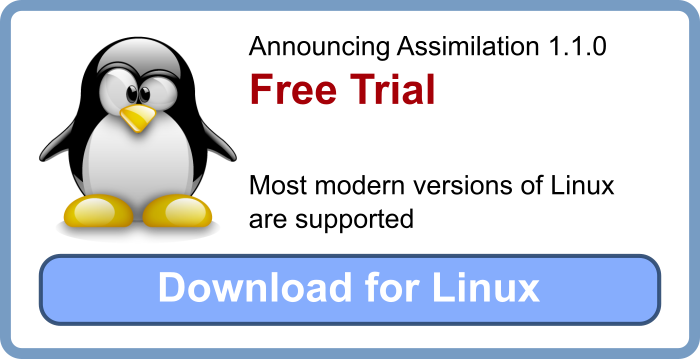
Those of you who’ve been following my blog for a while know something about the Assimilation System Management Suite – how it provides an always up-to-date CMDB, integrated monitoring, continuous security compliance monitoring, and an up-to-date network map – in an incredibly scalable way with near-zero configuration – and how it does all this without setting off network security alarms.
You Can’t Manage What You Can’t See
You can’t manage what you can’t see. We give you X-ray vision into your infrastructure – making hidden things visible. Visibility and insight help solve a number of the thorniest problems in IT management.
If you haven’t given it a try yet, now is the perfect time – because we just announced Assimilation Release 1.1.0, and to celebrate, we’re offering a limited number of supported free trials. To get started on your free trial, click on the image below.
Assimilation Release 1.1.0 Description
Adapted from our GitHub release information.
Assimilation Release 1.1.0 Bug Fixes
- Installer now locks down the version of Neo4j RPMs it installs. https://trello.com/c/o2KPR0aB
- Made the code stop barfing on Neo4j beta release version numbers https://trello.com/c/eTwkkWMI
- Ensured that built releases have the right version number everywhere https://trello.com/c/cc8k892c
- Changing MAC/IP association no longer makes the CMA sick https://trello.com/c/ySlAkWJC
- Lock down Neo4j RPM version after downloading.
- README.md fixes
Assimilation Release 1.1.0 New Features
- Significant performance improvement for accessing Drone (server) nodes in the database.https://trello.com/c/p19w7Jyn
- Added a best practice rule to discourage tunnelled ssh passwords.
- Verified operation against Neo4j 2.3.0 – and changed installer to favor that release. https://trello.com/c/nHUuTNUT
- Updated to py2neo version 2.0.8 – to get needed bug fixes
- Register installations https://trello.com/c/jGsV4dt4
- Added more tests to the test suite
Assimilation Release 1.1.0 Caveats
Special Note: This release cannot make use of older databases. The workaround is to start the CMA one time with the –cleandb flag, and restart all your nanoprobes. Sorry about that.
- Not compatible with previous database formats.
- Sudoers discovery is disabled for this release – will reappear later on
- Documentation has not been fully updated to reflect move to github. No doubt other shortcomings exist as well. Sorry! Please fix and generate a pull request.
- No alerting, or interface to existing alerting (hooks to build your own interface are included) high availability option for the CMA is roll-your-own using Pacemaker or similar queries could benefit from more indexes for larger installations.
- The CMA will suffer performance problems when discovering IP addresses when large numbers of nanoprobes are on a subnet.
- no GUI
- use with recent versions of Neo4j requires disabling authentication on Neo4j
- Best practices alerts currently only come out in syslog – not as events. Sorry!
- Our current process only allows us to distribute 64-bit binaries. Feel free to build 32-bit binaries yourself. They still work for Ubuntu, and probably Debian and 7.0 and later versions of CentOS.
- The magic installer can’t install CMAs onto Fedora.

Please note: I reserve the right to delete comments that are offensive or off-topic.